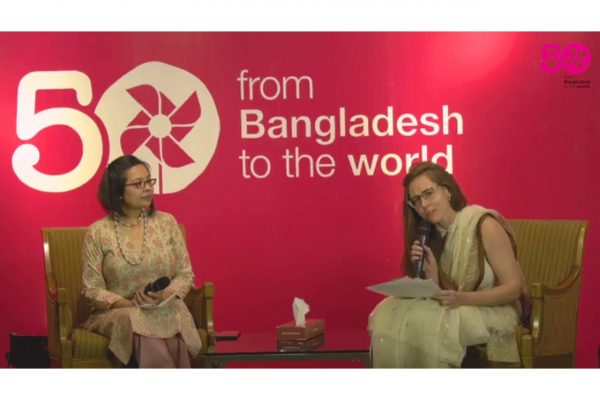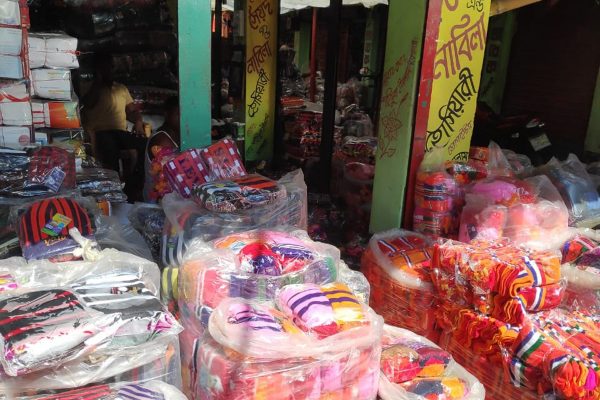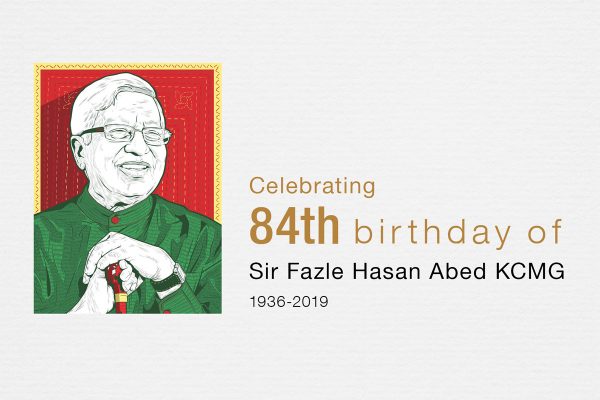Wise Prize for Education Laureate Speech by Sir Fazle Hasan Abed
Reading Time: 7 minutes
Over the ages, the Arabian Peninsula has seen great spiritual and intellectual ferment and served as a vital conduit for the spread of secular knowledge and spiritual values to the wider world, so it is fitting that the WISE summit be held here in Qatar, bringing together experts and decision makers from across the globe.

Excellencies, Ladies and gentlemen, good afternoon. It is a matter of great honour and privilege for me to be standing before you today to deliver this address here at the World Innovation Summit for Education in Doha.
Since the outcome of education is the shaping of minds that ultimately shape society, we thought it necessary first to envision the kind of society that we aspired for. So, before developing our curriculum, we consulted not only with the top education experts from around the world but also with the leading thinkers of the time. Instead of focusing on physical infrastructure, we concentrated our efforts on developing state-of-the-art teaching materials and child-centered learning methodologies.
What emerged was a highly innovative low-cost model in primary education. Our one-room-one-teacher schools each enrolled around thirty children, a majority of them girls. Children were taught the basic primary curriculum and took part in co-curricular activities. The focus was on making the process of learning enjoyable. The teacher was a woman from the local community who had at least graduated from high school. Children from the poorest of families who had either not entered formal schools or had dropped out were enrolled and provided with educational materials free of cost.
Ladies and gentlemen, though we are here to celebrate innovation, we must accept that innovation alone is not enough. In a world rife with poverty and deprivation, addressing any wide-spread problem requires reaching significant scale. Once we were convinced of the effectiveness of our school model, we worked to achieve efficiency. Then, having put in place the necessary infrastructure and gathered the required resources, we expanded nationally. Constantly assessing the needs of those left out of mainstream interventions, we also grew vertically, to include children of ethnic minority communities and those with special needs into our schools.
While a large majority of BRAC graduates were transitioning on to secondary schools, many adolescent girls were dropping out before completing secondary education because of social pressures and the fact that their families placed little importance on education for girls. For them, we set up a ‘continuing education’ programme, which eventually became platforms for further functional education and empowerment of adolescent girls.
To address the broader issue of low primary school retention rates, we developed a network of pre-primary schools that familiarised young children from illiterate households with school discipline. Previously a luxury reserved for the elite, the concept of pre-primary education as a tool in improving primary retention and performance has now been adopted into the national education system of Bangladesh.
In order to address high drop-out rates at the secondary level, we began providing support to the weakest performing mainstream schools through training for teachers in English, Mathematics and Science. We also worked to develop the capacity of school administrators and management committees. Innovative concepts such as peer mentoring and tutoring were introduced to motivate poor secondary students and provide them with the extra help they were unable to get at home.
As we continued to approach our work through a life-cycle lens, we realised that many of our BRAC school graduates who had continued onto secondary school and had come of university-going age would be unable to pursue higher education because of financial need. So we began administering scholarships to high performing students from poor families to encourage them to go to university.
However, we found that most universities in Bangladesh were producing graduates who remained largely unaware of the country’s needs and their responsibilities to their society. So in 2001, we set up BRAC University in an attempt to produce leaders who would be sensitive to the needs of the marginalised. The creation of knowledge was prioritised at the university through the setting up of several post-graduate institutes for research in areas critical to Bangladesh’s development. One of these is the Institute of Educational Development, whose broad mandate is to improve the quality of education in the country by developing and improving teaching-learning methods and tools.
Ladies and gentlemen, these experiences I have just shared with you demonstrate the process of constant innovation which we employed at BRAC to overcoming inequities in Bangladesh’s education sector. Our model was one that could be adapted to the context of any developing country struggling with educational reform. Over the last decade, BRAC itself has expanded beyond Bangladesh to nine countries across Asia, Africa and the Caribbean. In four of those countries, we have replicated our education model. I’m proud to state that BRAC is now the largest private, secular education provider in the world, with 30,000 primary schools and 15,000 pre-primary schools. To date, nearly 5 million children, mostly girls, have graduated from BRAC schools and an overwhelming majority of them have gone into the public school system, performing, on average, better than their mainstream peers.
There are many lessons to be learned in educating millions of children across contexts as varying as Afghanistan and Uganda. The first and most important lesson is not to lose ourselves in facts and figures, because the most significant change is that which occurs in individual lives. I could talk to you at great length about our work but not be able to explain the pride I felt meeting Mitu, the daughter of a Bangladeshi brick-field worker, as she was about to go to university abroad on a scholarship facilitated by BRAC. I would not be able to adequately convey the excitement in Mitu’s face at the thought of the possibilities that lay ahead of her, having come this far from the one-room-one-teacher BRAC school in her village in a remote corner of Bangladesh.
Let me take this opportunity to highlight three issues that I believe education innovators, thought leaders and policy makers ought to think about in the coming days and months.
Till recently, the issue of early childhood development had been dealt with primarily in the context of health or nutrition. Equally important at this stage are opportunities for attachment, learning through exploration, discovery and stimulation, as these ensure the child’s cognitive, motor, language and emotional development. There are 200 million children under the age of 5 in the world today. Unless we act quickly, many of them will not get the opportunity to develop to their full potential due to poverty, poor nutrition and lack of stimulation.
The situation in Bangladesh, as an example, gives us cause for alarm – recent studies show that 50 percent of mothers in the rural areas were unaware of the importance of fostering curiosity and self confidence in their children and considered ‘play’ an entire waste of time. The clock is ticking on this very pertinent issue and unless proactive effort is made in both research into practical applications for ECD and teacher training as well as awareness and communication for behavior change among parents and guardians, the development window will close for these children and an incredible amount of human potential will be lost to us forever. Thus, I consider early childhood development to be the next frontier in educational development.
Ladies and gentlemen, the world around us is becoming increasingly complex and fast-paced and traditional social structures are dissolving rapidly. It is becoming essential for us to equip our children with the social and emotional tools necessary to navigate through life.
But what is social and emotional learning? It is the acquisition of skills which makes us socially aware, emotionally intelligent and confident. These essential skills of the 21st century workforce enable us to tackle difficult situations and make decisions that are socially effective, taking into consideration each individual’s responsibilities to the wider society. They promote teamwork and more effective organisation, enhance harmony in families and greater gender equality.
I believe that the education of the future must take into account the necessity of building these skills. In the context of developing countries, where the scarcity of resources puts additional strain on social relationships and behaviour, the need to invest in socially conscious citizens is absolutely imperative in reducing conflict and encouraging healthy dynamics.
I believe technology has the potential to truly democratise education. I envision a world where even the poorest student in the remotest corner of the world will be able to learn from the world’s best teachers because technology will have overcome financial barriers as it has geographical boundaries. They will also be able to participate in the creation and perpetuation of ideas and human experience.
The education of today must prepare the citizens of tomorrow to thrive in this collaborative world. For those of us in the developing world, as we work towards universal access and maintenance of quality, it will be important to keep this future in mind so this does not become yet another type of exclusion for our children. This means investing now in the right tools and technologies so that we can expose our children to the best educational opportunities.
Ladies and gentlemen, let me conclude by reciting what the great Chinese philosopher Confucius had said about knowledge and development two and a half thousand years ago:
When knowledge is extended, the will becomes sincere. When the will is sincere, the mind is correct. When the mind is correct, the self is cultivated. When the self is cultivated, the clan is harmonised. When the clan is harmonised, the country is well governed. When the country is well governed, there will be peace throughout the land.
Thank you.





